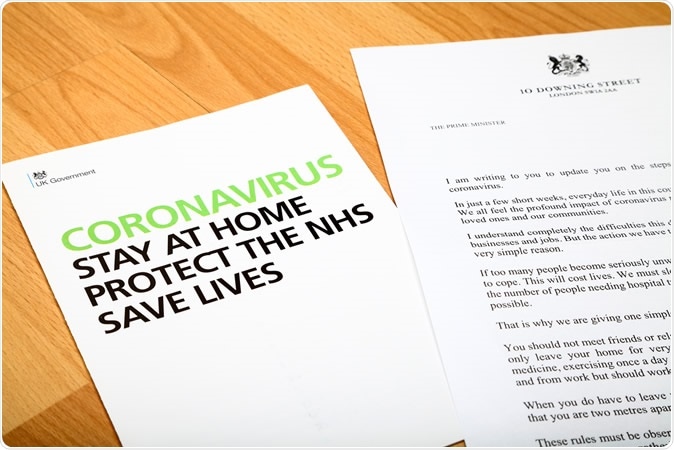The coronavirus disease (COVID-19) is actively spreading throughout the globe, affecting 184 countries and territories. In the United Kingdom, the country has seen the highest daily numbers of recorded coronavirus deaths – 854 on Monday and 786 on Tuesday, prompting scientists to race toward determining how vast the virus is spreading in the UK.

Leeds England UK April 6 2020 A UK Government information letter from the prime minister Boris Johnson updating the public on the coronavirus covid 19 pandemic urging people to stay home. Image Credit: Andrew E Gardner / Shutterstock
The scientists believe that there is an urgent need to determine how prevalent the severe acute respiratory syndrome coronavirus 2 (SARS-CoV-2), the pathogen that causes COVID-19, is in the UK community. This way, proper tracing, isolation, and quarantine measures can be implemented to contain the spread of the virus.
.jpg)
Novel Coronavirus SARS-CoV-2 This transmission electron microscope image shows SARS-CoV-2, the virus that causes COVID-19, isolated from a patient in the U.S. Virus particles are shown emerging from the surface of cells cultured in the lab. The spikes on the outer edge of the virus particles give coronaviruses their name, crown-like. Credit: NIAID-RML
Volunteers
The team plans to select thousands of volunteers randomly. The participants should be at least 18 years old, a current resident of the UK, those who are not currently admitted to a healthcare facility, and those who had not been previously tested for COVID-19.
For the first part of the study, the testing of participants will be limited to Oxford. Eventually, the team plans to expand to other regions in the UK. Those who are interested but live in other regions, are still welcome to take part in the research, say the researchers.
The researchers emphasize that there is no compensation for those participating in the study. Further, there will be no cost for the participants, and the only benefit is, they will be made aware if they are carriers of the SARS-CoV-2 virus.
What tests will be done?
The team intends to compare three types of tests for COVID-19 – the serology immunoassay, nanopore sequencing diagnostic approach, and the polymerase chain reaction (PCR). To facilitate sample collection, the researchers will process the courier delivery and pick-up of test kits to and from the homes of participants.
Serology needs a finger prick ‘at-home’ blood test, which can be discarded after use, while the other two tests require throat swabs processed in the laboratory. The serology test detects the presence of antibodies against the COVID-19 virus.
The PCR test works by detecting short sections of genetic material unique to the virus. The nanopore technology sequences the entire viral genome through a tiny protein known as a nanopore.
The participants will be informed on the schedule of the test arrival. They will also be required to read an instruction manual, which contains a consent form. Also, the team will send an online questionnaire, while those who cannot access the internet, a paper version will be given for them to complete. The two throat swabs need to be picked up and dropped off to the laboratory for processing via courier.
The team promises to uphold data privacy, and personal data will only be used for courier services. The result of the tests will remain confidential.
The team reiterates that they can only assist in testing, but not in the treatment of those who have the virus. They should seek medical advice from the NHS by calling the hotline.
All test kits will be accounted for, and only the person listed in the application who consents to participate can take the tests. If more than one person lives in the household, they are advised to apply online, too.
Mass testing is essential for containing the spread of the virus. Aside from this, social distancing is still recommended by health experts. In most countries, governments have imposed lockdowns and community quarantines to slow down the spread and help flatten the curve.
Worldwide, the case toll has reached 1.43 million, while the number of people who died has topped 82,000. The United States has the most significant number of confirmed cases, with nearly 400,000 people testing positive for COVID-19.